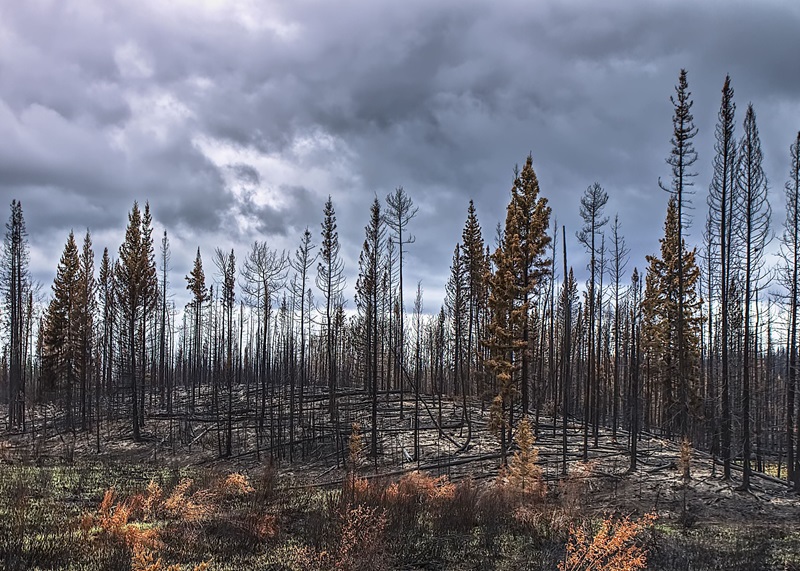‘Trees going up like Roman candles’ as fire season starts early in B.C., Alberta

Susanne Langan first noticed the Burgess Creek wildfire from her home in British Columbia’s Cariboo region on Saturday afternoon as a distant, thin column of smoke.
But as winds picked up that night, the flames became more aggressive.
“I could see lots of trees going up like Roman candles.… There was certainly lots of smoke rising from it,” said Langan, who works as an equipment operator at Mount Polley Mine, about 50 kilometres north of Williams Lake.
Langan, who says she has lived “off the grid” in the area for 39 years, is among a handful of Cariboo residents put under evacuation alert and told to be ready to leave at short notice, as fears of an early start to the B.C. and Alberta wildfire seasons materialized.
In addition to the 1,600-hectare Burgess Creek fire about 600 kilometres north of Vancouver, the tiny town of Endako, a further 400 kilometres northwest, is also under an evacuation alert, threatened by a blaze that the BC Wildfire Service said on Sunday was less than a kilometre west of the town.
Mark Parker, chair of B.C.’s Regional District of Bulkley-Nechako, said the evacuation alert for Endako was issued Sunday after 60 km/h winds began pushing the flames toward the community of a few dozen homes that sit on the north side of Highway 16.
“That fire started on Saturday afternoon, and at that time, the wind was blowing away from the community of Endako,” he said.
“By Sunday though, the wind had completely shifted and was blowing back toward the community.”
The BC Wildfire Service said in an online post on Sunday that firefighters were working on the east and west flanks of the fire while community wildfire response worked along the south flank.
Related: Active spring wildfire season may be in store for B.C. as drought persists
Heavy equipment and two helicopters were providing support to fight the fire which the service said measured about 25 hectares.
“A structure protection specialist is en route and will assess the possible need for structure protection upon arrival,” the post said.
Both the Endako and Burgess Creek fires are believed to have been caused by human activity.
The Cariboo Regional District issued the alert about the Burgess Creek fire on Sunday night, covering six parcels of land over 32 square kilometres. It said the fire is dangerous and residents should prepare to leave at short notice.
Information posted Monday by the BC Wildfire Service said nine wildfires had started in the province in the previous 24 hours.
Officials have worried this year’s wildfire season could be a challenging one, with much of the province continuing to experience significant drought.
Parker said those in his region, like much of the province, have been worried about the lack of snowpack which is at record lows in B.C.
“And then we just have had limited, limited amounts of precipitation in the last month,” he said.
“So, that dry grass season, it’s even drier than it normally would be. It’s always a threat, and we’ve always dealt with some grass fires during the early spring season, but this year they seem to be a lot more volatile, just from the dry conditions.”
Related: Drought, heat raise risk of repeat of last summer’s record-breaking wildfires
Last year’s B.C. wildfire season saw more than 28,400 square kilometres of forest and land burned, hundreds of homes destroyed and tens of thousands of people forced to evacuate. Canada’s 2023 wildfire season was the most destructive ever recorded, with the Interagency Forest Fire Centre reporting 18.5 million hectares of land was burned.
Langan, who lives on a remote property in the Cariboo alert zone with her daughters, says their nearest permanent neighbour is 15 kilometres away. Her property is powered by a generator.
“At times, there was a lot of smoke and you couldn’t see where the fire actually was. The wind changed directions and at times the smoke would drift here over the ranch and you could definitely smell it,” said Langan, whose ranch is at the north end of Ben Lake.
She said she had been watching helicopters fly over her house on their way to the fire.
Cariboo Regional District had called her to alert her about the fire, which she said was nice, but she said she had no plans to leave immediately and hadn’t packed. She described herself as a “calm person.”
Seeing wildfires up close isn’t new to Langan, who worked with neighbours to put out wildfires in 2017.
“One of the local contractors brought over a dozer and helped with that. At that time, when they later on issued an evacuation order, nobody left because we knew that the only ones who were gonna save our homes were us,” said Langan.
In northern Alberta, residents of Saprae Creek Estates, a hamlet near Fort McMurray, were told Sunday to prepare themselves for a possible evacuation.
RCMP asked on Monday members of the public to immediately stop flying drones over the fire, or risk charges. “This behaviour is a major public safety concern as helicopters are a key element to combating these fires and keeping them under control,” Mounties said in a news release.
Another alert was issued in Alberta on Monday for the rural subdivision of Bilby Common in Lac Ste. Anne County, west of Edmonton, but it has since been rescinded.
— By Ashley Joannou and Nono Shen in Vancouver, and Lauren Krugel in Calgary
Feature image by iStock.com/DK Johnston







